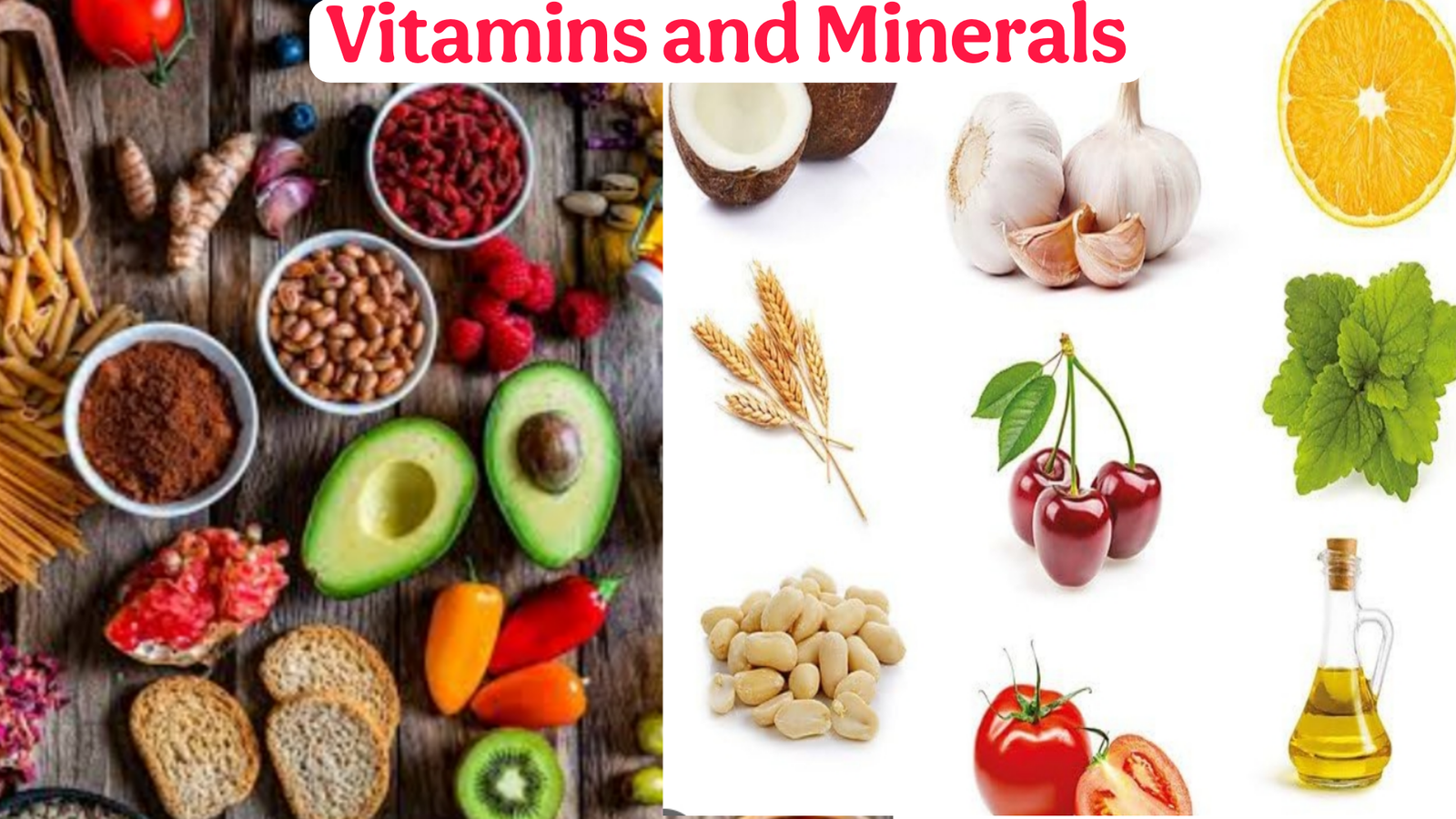Vitamins and Minerals: Essentials for a Healthy Daily Life
Introduction
In today’s fast-paced world, maintaining optimal health has become more crucial than ever. One of the key pillars of good health is proper nutrition, and within that lies the essential role of vitamins and minerals. These micronutrients may be required in small amounts, but their impact on bodily functions is enormous. From boosting immunity to ensuring proper organ function and bone health, vitamins and minerals are indispensable in daily life.

This article will take you through the types, benefits, food sources, deficiency symptoms, and daily requirements of essential vitamins and minerals to help you maintain a healthy and balanced lifestyle.
What are Vitamin and minerals?
Vitamins
Vitamins are organic compounds that our body needs in small quantities to function properly. They are classified into two types:
Water-soluble vitamins – e.g., Vitamin C and B-complex vitamins
Fat-soluble vitamins – e.g., Vitamins A, D, E, and K

Minerals
Minerals are inorganic elements that are vital for process such as nerve transmission, bone formation and enzyme activation. They are divided into:
Macrominerals – e.g. Calcium, Magnesium, Sodium, Potassium
Trace minerals – e.g., Iron, Zinc, Copper, Iodine, Selenium
Importance of Vitamins in Daily Life
1. Vitamin A (Retinol)
Function: Enhances vision, boosts immunity, supports skin and cell growth.
Sources: Carrots, sweet potatoes, spinach, liver, dairy products.
Deficiency Symptoms: Night blindness, dry skin, frequent infections.
2. Vitamin B1 (Thiamine)
Function: Converts carbohydrates into energy, supports nerve function.
Sources: Whole grains, pork, legumes, seeds.
Deficiency Symptoms: Fatigue, nerve damage, muscle weakness (beriberi).
3. Vitamin B2 (Riboflavin)
Function: Energy production, antioxidant function.
Sources: Eggs, milk, lean meats, green vegetables.
Deficiency Symptoms: Cracked lips, sore throat, skin disorders.
4. Vitamin B3 (Niacin)
Function: Aids digestion, skin health, and nervous system.
Sources: Chicken, tuna, peanuts, mushrooms.
Deficiency Symptoms: Pellagra (diarrhea, dermatitis, dementia).
5. Vitamin B6 (Pyridoxine)
Function: Protein metabolism, brain development.
Sources: Bananas, fish, potatoes, fortified cereals.
Deficiency Symptoms: Anemia, depression, confusion.
6. Vitamin B12 (Cobalamin)
Function: Nerve function, red blood cell production.
Sources: Meat, dairy, eggs, fortified cereals.
Deficiency Symptoms: Fatigue, memory problems, anemia.
7. Vitamin C (Ascorbic Acid)
Function: Strengthens the immune system, collagen formation, antioxidant.
Sources: Citrus fruits, bell peppers, strawberries, broccoli.
Deficiency Symptoms: Scurvy, bleeding gums, weak immunity.
8. Vitamin D
Function: Absorbs calcium, promotes bone health.
Sources: Sunlight, fortified milk, egg yolks, fish liver oil.
Deficiency Symptoms: Rickets in children, osteoporosis in adults.
9. Vitamin E (Tocopherol)
Function: Antioxidant, skin repair, immune function.
Sources: Nuts, seeds, spinach, vegetable oils.
Deficiency Symptoms: Muscle weakness, vision problems.
10. Vitamin K
Function: Blood clotting, bone metabolism.
Sources: Green leafy vegetables, Muscle weakness, vision problems.
10. Vitamin K
Function: Blood clotting Brussels sprouts.
Deficiency Symptoms: Excessive bleeding, weak bones.
Importance of Minerals in Daily Life
1. Calcium
Function: Builds strong bones and teeth, nerve signaling, muscle contraction.
Sources: Milk, yogurt, cheese, kale, almonds.
Deficiency Symptoms: Weak bones (osteoporosis), muscle cramps.
2. Iron
Function: Formation of hemoglobin, oxygen transport.
Sources: Red meat, spinach, lentils, fortified cereals.
Deficiency Symptoms: Fatigue, anemia, shortness of breath.
3. Magnesium
Function: Muscle and nerve function, energy production.
Sources: Nuts, seeds, whole grains, leafy vegetables.
Deficiency Symptoms: Cramps, fatigue, abnormal heart rhythms.
4. Potassium
Function: Regulates fluid balance, muscle contractions, heart rhythm.
Sources: Bananas, potatoes, oranges, beans.
Deficiency Symptoms: Weakness, irregular heartbeat, constipation.
5. Zinc
Function: Boosts immunity, wound healing, DNA synthesis.
Sources: Meat, shellfish, legumes, seeds.
Deficiency Symptoms: Hair loss, weak immune response, skin issues.
6. Iodine
Function: Thyroid hormone production.
Sources: Iodized salt, seaweed, dairy.
Deficiency Symptoms: Goiter, developmental delays in children.
7. Selenium
Function: Antioxidant, prevents cell damage, supports thyroid.
Sources: Brazil nuts, tuna, eggs, sunflower seeds.
Deficiency Symptoms: Weak immunity, muscle weakness.
8. Phosphorus
Function: Bone and teeth formation, energy production.
Sources: Dairy, fish, poultry, whole grains.
Deficiency Symptoms: Weak muscles, bone pain.
Daily Requirements of Vitamins and Minerals
Nutrient Daily Requirement (Adults) Unit
• Vitamin A 700–900 mcg
• Vitamin C 65–90 mg
• Vitamin D 600–800 IU
• Vitamin E 15 mg
• Vitamin K 90–120 mcg
• Vitamin B12 2.4 mcg
• Calcium 1000–1300 mg
• Iron 8–18 mg
• Magnesium 310–420 mg
• Potassium 2600–3400 mg
• Zinc 8–11 mg
• Iodine 150 mcg
• Selenium 55 mcg
How to Ensure Adequate Intake?
1. Eat a Balanced Diet
Incorporate a variety of fruits, vegetables, whole grains, proteins, and healthy fats in your meals to naturally get essential nutrients.
2. Opt for Fortified Foods
Some foods like milk, cereals, and juices are fortified with vitamins and minerals like Vitamin D, B12, or Iron.
3. Supplements (if needed)
In cases of deficiency, age-related needs, pregnancy, or certain health conditions, supplements may be required—but only under medical guidance.
4. Limit Processed Foods
Junk and processed foods are often nutrient-poor and high in sugar, salt, and unhealthy fats. Limit intake to avoid nutrient imbalances.
Signs You May Be Lacking Vitamins or Minerals
• Persistent fatigue and weakness
• Brittle nails and hair loss
• Frequent infections or slow wound healing
• Poor night vision
• Numbness or tingling in hands and feet
• Mood changes like depression or irritability
• Irregular heartbeat
• Pale skin or shortness of breath
Benefits of Getting Enough Vitamins and Minerals
Boosts Immunity
A strong immune system is crucial for fighting infections and preventing illness. Vitamins C, D, E, and Zinc are especially important.
Enhances Brain and Mental Health
B-complex vitamins, magnesium, and omega-3 fatty acids support cognitive function, memory, and mood regulation.
Improves Energy Levels
Vitamins like B1, B2, B3, and Iron help convert food into energy and combat fatigue.
Maintains Bone Health
• Calcium, Vitamin D, Vitamin K, and phosphorus work together to keep bones strong and reduce the risk of fractures.
Supports Reproductive and Skin Health
• Zinc, Vitamin A, and E play key roles in skin regeneration, hormone balance, and fertility.
Special Nutritional Needs
Children and Adolescents
• Higher calcium and Vitamin D for growing bones.
• Iron for cognitive development.
Pregnant Women
• Need more folic acid, iron, and calcium.
• Helps fetal development and prevents birth defects.
Elderly
• Require more Vitamin B12, D, and calcium.
• Supports mobility and cognitive health.
Vegans and Vegetarians
• Should focus on B12, iron, zinc, and omega-3s from plant or fortified sources.
Conclusion
Vitamins and minerals may be small in quantity, but their importance in daily life is immense. From supporting immune function and brain health to ensuring strong bones and glowing skin, these micronutrients are fundamental to living a vibrant, disease-free life. The best way to meet your daily requirements is by eating a diverse and nutrient-rich diet, and only turning to supplements when absolutely necessary.
Taking the time to understand the vital role of vitamins and minerals in your life can help you make smarter dietary choices, ultimately leading to a healthier and happier you.
FAQs on Vitamins and Minerals
Q1. Can I get all vitamins and minerals from food alone?
Yes, a well-balanced diet can provide most nutrients. However, some people may require supplements due to health conditions or dietary restrictions.
Q2. What happens if I take too many supplements?
Excessive intake, especially of fat-soluble vitamins like A, D, and E, can be toxic. Always consult a doctor before starting supplements.
Q3. How do I know if I have a deficiency?
Blood tests can determine vitamin and mineral levels. Consult a healthcare provider if you experience symptoms like fatigue or frequent illnesses.
I hope that you liked this article.
Thanks!! 🙏 😊
Writer: Vandita Singh, Lucknow (GS India Nursing Group)